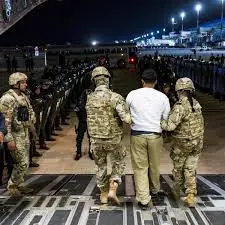US official’s email on gang assessment sparks concern in intelligence agencies

An internal email from a senior U.S. intelligence aide recently stirred major concern across the intelligence community. Joe Kent, acting chief of staff to the U.S. Director of National Intelligence Tulsi Gabbard, sent the email. He claimed that the Venezuelan government might use the criminal gang Tren de Aragua to harm U.S. interests. However, intelligence assessments showed no solid proof of this connection.
The Email and Its Controversial Claims
Kent’s email, dated March 24, argued it was “common sense” to assume Venezuelan officials use gangs like Tren de Aragua as proxies. This gang is infamous for drug trafficking, extortion, and violent crime. His views echoed former President Donald Trump’s public statements, which justified deporting Venezuelan immigrants under the Alien Enemies Act.
Despite these claims, agencies such as the CIA and the National Intelligence Council (NIC) found no credible evidence linking Venezuela’s government to the gang. They warned against drawing conclusions based on assumptions rather than facts.
Backlash Within the Intelligence Community
The email quickly alarmed many intelligence professionals. They worried political bias was influencing analysis. In response, the NIC released a memo clarifying that no proof connects the Venezuelan government to Tren de Aragua’s activities.
Despite this, Tulsi Gabbard dismissed NIC officials Michael Collins and Maria Langan-Riekhof. These officials helped produce the memo. Critics argued that the firings aimed to remove dissenting voices who challenged the administration’s narrative.
Lawmakers voiced strong concern. Representative Jim Himes, who serves on the House Intelligence Committee, condemned the firings. He said, “Tailoring intelligence to fit politics destroys its integrity and usefulness.” Many fear such politicization threatens national security.
The Importance of Intelligence Independence
This controversy highlights a persistent problem in U.S. intelligence work. Agencies must provide unbiased, evidence-based analysis. Yet, political pressure often complicates this goal. Intelligence guides key policy decisions. Therefore, preserving its objectivity is crucial.
Experts warn that politicizing intelligence can lead to bad policy and mistrust. It also damages morale within agencies. Dr. Elaine Matthews, a former CIA analyst, said, “Pressuring professionals to conform degrades intelligence quality. It risks dangerous mistakes in foreign policy.”
About Tren de Aragua and Venezuela
Tren de Aragua started as a prison gang in Venezuela. It evolved into a transnational criminal group involved in drug trafficking and kidnapping. The gang operates in several South American countries and reportedly has links to criminal networks in the U.S.
However, intelligence assessments found no clear evidence that the Venezuelan government supports or controls the gang. Some analysts argue the government may tolerate such groups but does not officially direct them. Others warn that confusing gangs with state actors can harm diplomatic efforts.
Political Context and Fallout
The Trump administration took a hard stance on Venezuela, labeling it a hostile regime. This view influenced some intelligence officials to adopt a tougher posture in their analysis. Gabbard’s leadership intensified this stance, especially after removing NIC officials who contradicted the administration’s claims.
This situation raises bigger questions about how intelligence agencies balance objective analysis with political demands. Intelligence professionals must resist pressure to alter facts, even when those facts are inconvenient for leaders.
Steps Toward Restoring Trust
Experts say restoring trust requires reaffirming intelligence independence. Agencies should report findings without fear of retaliation or political interference. Some lawmakers propose congressional hearings to investigate the firings and ensure agencies remain impartial.
They also recommend stronger protections for whistleblowers and career officials who provide honest intelligence. Dr. Matthews emphasized, “Protecting truth-tellers is vital for intelligence integrity.”
Conclusion
The recent email controversy shows the challenges intelligence agencies face today. As global tensions rise, the need for unbiased intelligence grows. Policymakers depend on truthful, fact-based analysis to make sound decisions.
Ensuring intelligence remains free from political bias is critical for U.S. national security. The country must safeguard the independence of its intelligence professionals. Only then can it effectively address the complex threats of the modern world.






